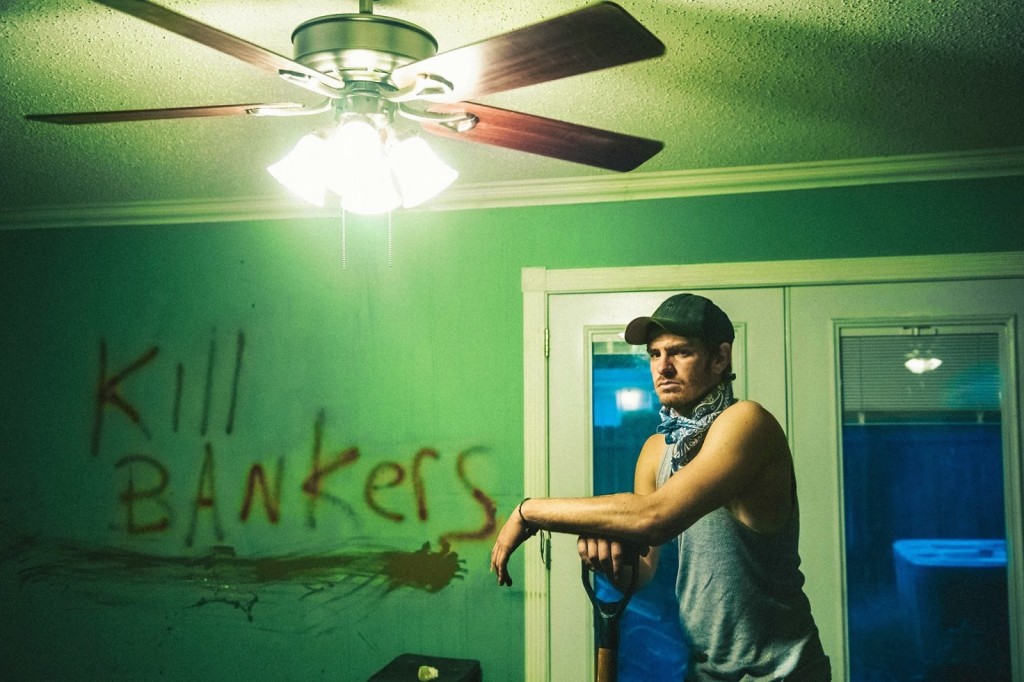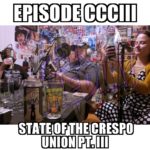 Hey Orlando, Florida, congrats on being in a movie starring Michael Shannon and Andrew Garfield! Too bad it’s because you had one of the biggest mortgage foreclosure markets in the country, but at least they filmed the movie there and brought some much needed economic support to the region. Oh…the movie was filmed in New Orleans, Louisiana? Well…better luck next time, I guess.
Hey Orlando, Florida, congrats on being in a movie starring Michael Shannon and Andrew Garfield! Too bad it’s because you had one of the biggest mortgage foreclosure markets in the country, but at least they filmed the movie there and brought some much needed economic support to the region. Oh…the movie was filmed in New Orleans, Louisiana? Well…better luck next time, I guess.
“99 Homes” is the story of a man trying to provide for his family during a very tough time, and what that man is willing to do to both himself and others so he can care for the ones he loves. It is one thing to sit in relative comfort and say to yourself that you have certain moral lines and ideas about ethics and legalities, it is another to have your comforts taken away and to be put into a dangerous position, one which makes you reevaluate what you may be willing to do.
Dennis Nash (Andrew Garfield) is such a person, a honest and hardworking family man who finds himself without work due to the worldwide economic collapse of 2007, and due to the lack of work and lack of funds, finds himself on the receiving end of an eviction, one from his long time family home that is packed with memories, which makes it all that much harder. But now the bank owns the home, and working as a rep for the bank is asshole realtor Rick Carver (Michael Shannon), who spends all of his time pressuring families to sell their homes for a few thousand dollars so he can flip them, and if they don’t take the pay out, he just waits for the eventual eviction process and takes the home then.
So Rick is the type of person fine with making his living on the backs of the destroyed lives of other people, he doesn’t care that they are losing their homes, he only sees people who over extended themselves financially and stopped paying their bills, he only sees dollar signs in the form of flipped homes. And most importantly, he sees dollar signs in the form of a little bit of government scamming, taking appliances out of homes owned by Fannie Mae and then billing the government for the costs of the replacements, allowing him to pocket thousands of dollars per home. Hence his desire to evict as many families as possible, which includes dear old Nash.
Long story short, in order to get his family out of the shitty motel they are living in with tons of other evicted families, Dennis goes to work for the only guy in town with any work for him – good old Rick Carver. In a Faustian twist, Dennis works for the person who helped put him on the street, gains his trust, and learns about how they are scamming the system. And when he is given his first check with multiple zeroes on it, he sees a way to get his family home back, and he dives in, ethics and morals be damned. Because what good is it to have moral lines when it comes to providing a steady and healthy life for one’s progeny?
On the surface, “99 Homes” is a drama about the housing market crisis and the lives destroyed by the ridiculous loans given out to people who couldn’t afford them by banks who couldn’t care less about the possible outcomes, disastrous or not. They even touch on how some mortgage foreclosure markets were so jam packed that the foreclosure courts were backlogged to the point of absurdity, causing judges to plow through cases quickly in order to merely get through them all, resulting in homeowners, some with legit gripes and some just scared and begging for their homes, having their futures decided in less than sixty seconds. And then there was that whole confusing period of time in which a loan payment department of a bank would tell owners to pay up or be foreclosed while at the same exact time a separate loan modification department from the exact same bank would tell the owner to default on those payments in order to get the loan modification process started. And then in comes a vulture like a Rick Carver, ready to pick the bones of the carcass and take what he needs so he can provide for his own precious little children.
But while “99 Homes” does get into this stuff in order to keep the plot moving along, it really is all about Dennis Nash, who comes to represent several archetypes. He is the Devoted Father, raising his son as a single parent with the help of his own mother, being the best dad he possibly can be, always putting his son’s needs first ahead of his own. He is the Struggling Homeowner, underwater on his mortgage and drowning in debt. He is the Desperately Unemployed, reduced to begging for the most menial jobs possible just so he can bring home a few bucks to his family, even brought to tears at the feeling of helplessness instilled in such a destroyed economy. He is the American Dream, after it has been dragged out into the street, beaten with a lead pipe and then shot in the back of the head execution style, all for the sin of believing in himself and what he was told. With these things wrapped up together, it might be surprising but it is certainly not shocking when he takes up with the person who helped put him out on the street and agrees to help him, doing everything from cleaning up shit to leading evictions, with the promise of bigger and better paychecks keeping him coming back for more, even bringing friends with him so he can help spread the wealth a little. Dennis Nash is a good person, even when he makes some dubious decisions, and this makes his sympathetic. We want to see him succeed and provide for his family, but at what cost does this come?
Meanwhile Rick Carver is the Businessman, the one who implores Nash not to attach emotions to property but instead see it all as a business, because after all capitalism dictates that the free market is always correct and hence above reproach, so when Carver bullies workers and displaces families all in the name of making a buck, he sees himself as doing honest to god business, nothing evil or corrupt, just working the system the way it was meant to be. So can we blame him? By his standards, no we can’t, because business is an emotion-free endeavor, but in reality, we all know that all actions have reactions, and his insistence on making his living by capitalizing on the suffering of his neighbors and community is deplorable and should eat away at his soul. It SHOULD. But does it?
“99 Homes” claims to be based on true events, but that does not mean there was a Dennis Nash or Rick Carver or the events in this movie actually happened the way they are depicted. Instead the true events are the market crash itself and how some people survived in that environment and how others thrived, both legally and illegally, and this story works as an amalgamation of these people, places and events, so while these exact people aren’t real, the story still feels very real and vital and true. Millions of people were sold the American Dream via home ownership, a dream only attainable through borrowing money, and then this dream dissipated and millions of people realized they were actually sold a bill of goods, and the time has come to collect, leaving them in the lurch. So the exact story may not be true, but this movie is as real as it gets.


 Spillover Bonus Episode – Look At This News
Spillover Bonus Episode – Look At This News Spoiler Bonus Episode – Blair Witch
Spoiler Bonus Episode – Blair Witch #303 – State of the Crespo Union Pt III
#303 – State of the Crespo Union Pt III Spoiler Bonus Episode – Mission: Impossible – Rogue Nation
Spoiler Bonus Episode – Mission: Impossible – Rogue Nation
Leave a Reply
You must be logged in to post a comment.